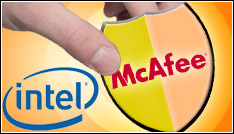Intel-McAfee Deal To Get EU Blessing Next Week

European regulators are reportedly ready to approve the acquisition of McAfee after Intel’s concessions
European approval of Intel’s $7.68 billion (£4.8 billion) acquisition of security software vendor McAfee could come as early as next week, according to published reports.
The giant chip maker, which earlier this month made several concessions to ease European regulator antitrust concerns, offered even more changes, according to reports from Reuters and the Wall Street Journal.
The deal already has recieved approval from the US Federal Trade Commission.
More Concessions
Quoting unnamed sources, the news organisations reported that Intel officials had offered more concessions after McAfee rivals were unswayed about the first round of remedies. According to a Reuters source, a key part of the Intel concessions is ensuring that products from other software vendors will run without restrictions on Intel products.
McAfee is the world’s second-largest security software vendor behind Symantec, and competitors worry that if Intel buys McAfee, it could create an unfair advantage for McAfee technology, given the wide reach of Intel’s processor business. Intel controls more than 80 percent of the world’s processor market.
 The worry is that once the deal is closed, Intel may build security features in the chips that only McAfee software could take advantage of. Such concerns echo what the FTC and other US regulators said in lawsuits filed last year against Intel. In those suits – the FTC and Intel have since settled their legal dispute – the regulators said that Intel had made changes to some of its technologies, such as compilers, so that products from rivals such as Advanced Micro Devices would not work as well with them.
The worry is that once the deal is closed, Intel may build security features in the chips that only McAfee software could take advantage of. Such concerns echo what the FTC and other US regulators said in lawsuits filed last year against Intel. In those suits – the FTC and Intel have since settled their legal dispute – the regulators said that Intel had made changes to some of its technologies, such as compilers, so that products from rivals such as Advanced Micro Devices would not work as well with them.
The chip maker is looking to integrate more security capabilities onto its chips, which officials have said will make it more difficult for hackers to attack devices. In addition, the security software will run more quickly once it’s housed directly on the processor, they said.
Chip-based Security
Such on-chip security capabilities will become an increasing focus for Intel as it continues to push its products into the mobile world of Internet-connected devices, such as smartphones and tablets. Intel is looking to expand beyond its core PC and server chip businesses into other markets, including mobile devices and embedded applications. The McAfee acquisition will be a key part of that move, officials have said, as will Intel’s proposed $1.4 billion (£875 million) acquisition of Infineon’s wireless technology unit.
Intel intends to run McAfee as a separate business, with current McAfee CEO Dave DeWalt heading up the business. McAfee also will continue to sell its software to other companies. Speaking to analysts and reporters during a 13 January conference call to announce Intel’s quarterly earnings, CEO Paul Otellini said he still expects the McAfee deal to close soon, possibly as early as the first quarter, if the European Commission’s concerns are met.
The EC – the antitrust arm of the European Union – earlier this month extended the deadline for a decision on the deal by two weeks, to 26 January.
Intel over the past few years has had its share of run-ins with US and European regulators, who have accused Intel of anti-competitive behavior by offering OEMs price breaks and rebates to limit their use of AMD products. Intel executives have denied the claim, saying that while their business practices are aggressive, they are not illegal. Intel has settled most of the legal claims against it, without admitting any wrongdoing.